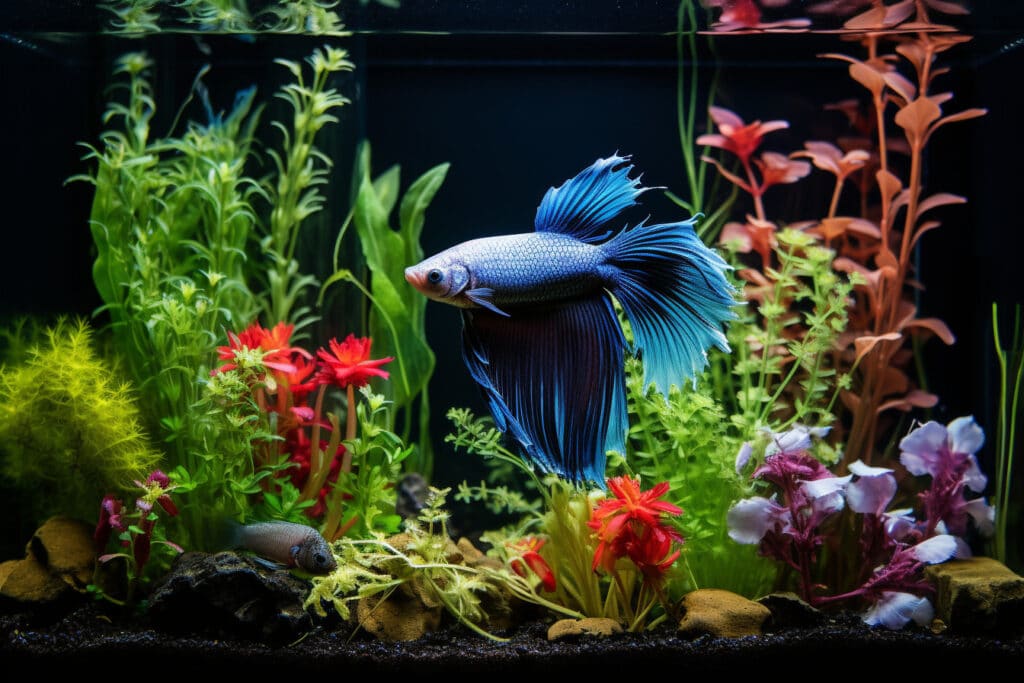Betta Fish Behavior Before Death,
Betta Fish Behavior Before Death: recognizing end-of-life signs, learn the essential signs indicating your betta fish might be nearing its final days or just feeling a little bit sick.
This comprehensive guide covers Betta fish death symptoms, disease signs, how to save a dying betta fish, how to distinguish between a sleeping betta and a dying one,
We will also provide a piece of advice on comforting your pet in their time of need, and the steps you can take for their well-being.

Betta fish are a popular choice for many aquarium hobbyists. However, like any living creature, they can fall ill and eventually pass away.
As Betta owners, it is important to understand our betta fish behaviors before death so we can provide the necessary care and support for their well-being.
Table of Contents 🦑
Medical Disclaimer: The information provided in this article is for educational purposes only and is not intended to replace professional veterinary advice. Always consult with a qualified veterinarian for any health concerns or treatments related to your pet. Your veterinarian can provide diagnoses and appropriate treatment options tailored to your pet’s specific needs.
Signs That a Betta Fish Might be Dying
As a betta fish owner, it can be distressing to see your fish showing signs of decline. It’s important to recognize the signs of a dying betta fish to take appropriate action and ensure the best possible care for your pet.
Physical changes such as color loss, fin deterioration, and unusual growths or lumps are common indicators that your betta fish may be struggling.
Unusual swimming behavior, such as difficulty swimming or floating to the surface, may also indicate a problem. Loss of appetite, lethargy, and lack of activity are also common symptoms to look out for.
Physical changes in appearance
Physical changes in appearance can be one of the first signs that a betta fish is nearing the end of its life.
The fish may appear pale, discolored, or develop red streaks or spots. Its fins may also start to deteriorate and become ragged or frayed. In addition, the fish may develop swelling or bloating in its belly or eyes.
It’s important to pay close attention to any changes in your betta fish’s appearance and seek medical attention if necessary.
Unusual swimming behavior
Unusual swimming behavior can be a sign that a betta fish is dying.
If you notice your betta fish is having difficulty swimming or is floating at the top or bottom of the tank, it could be an indication of a health issue. Your betta fish may also start to swim more slowly or erratically than usual.
If you observe any of these unusual swimming behaviors, it’s important to monitor your betta fish closely and take appropriate action to ensure their health and well-being.
Struggling to Breathe at the Top of the Tank
One thing to look out for is when your betta is gasping for air at the surface of the tank, which could be a sign that they are not getting enough dissolved oxygen. Remember, Bettas have a labyrinth organ that allows them to breathe from the surface, but it’s not good for them in the long run.
This behavior could be caused by high ammonia levels, an overcrowded tank, or diseases like ich, columnar, and anchor worms. Make sure to keep the tank clean, maintain proper water parameters, and keep an eye on the temperature to keep your betta healthy.
Betta Resting at the Bottom of the Tank
If you notice that your Betta is hanging out at the bottom of the tank, it could be a sign that something is not quite right.
Swim bladder disease, ammonia poisoning, dropsy, temperature shock, and low oxygen levels are all possible culprits.
Lack of interest in food
Loss of appetite is another common sign that a betta fish may be dying.
If your betta fish isn’t eating as much as usual or refusing food altogether, it could indicate that they are not feeling well. In some cases, a betta fish may stop eating entirely, which can quickly lead to malnutrition and further health problems.
It’s important to monitor your betta fish’s eating habits and seek veterinary care if they stop eating for an extended period.
Lethargy and lack of activity
When a betta fish is lethargic and inactive, it may indicate that it is not feeling well. A healthy betta fish is usually a very active fish, swimming around the tank, and exploring its environment.
However, if the betta fish is lying at the bottom of the tank or floating at the top, it may be a sign of illness or stress. It’s important to monitor your betta fish’s activity levels and seek veterinary attention if you notice any concerning changes.
💀 Common Causes of Death in Betta Fish
There are several common causes of death in betta fish. One of the most prevalent is poor water quality. Bettas are particularly sensitive to toxins in the water, so it’s crucial to maintain a clean and well-filtered tank.
Overfeeding is another leading cause of death in bettas. Overfeeding can cause constipation, which can lead to swim bladder problems and other health issues.
Disease and illness are also significant contributors to betta fish mortality rates. Bettas can be susceptible to various illnesses, including fungal infections, bacterial infections, and parasites. Finally, old age can be a natural cause of death in betta fish, and it’s not uncommon for a betta to live for only a few years.
Water quality issues
Water quality issues are one of the most common causes of death in betta fish. Poor water quality can result from a lack of proper filtration, infrequent water changes, or overstocking the tank.
High levels of ammonia, nitrite, or nitrate can be lethal to betta fish, so it’s important to test the water regularly and maintain a healthy and stable environment for your fish.
Maintaining great water quality is crucial for the health and well-being of your betta fish. Here are some tips to help you maintain a healthy environment for your betta:
Regular water changes: Change 20-30% of the water in the tank every week to remove any excess waste, uneaten food, and other pollutants.
Monitor water parameters: Test the pH, ammonia, nitrite, and nitrate levels in the water regularly using a reliable water testing kit. Aim for a pH of 6.5-7.5, ammonia and nitrite levels of 0 ppm, and nitrate levels below 20 ppm.
Use a good quality filter: Invest in a high-quality filter that is appropriate for the size of your tank. A filter helps to remove toxins and waste from the water, keeping it clean and healthy.
Avoid overfeeding: Overfeeding your betta fish can lead to excess waste in the water, which can harm your fish and decrease water quality. Only feed your betta what it can eat in a few minutes, once or twice a day.
Don’t overcrowd the tank: Overcrowding can lead to excess waste in the water, as well as stress and aggression among fish. A good rule of thumb is to have at least 1 gallon of water per inch of fish.
Overfeeding
Overfeeding is a common mistake made by many betta fish owners. It is important to avoid overfeeding as it can lead to digestive problems, obesity, and other health issues for your betta.
Betta fish only need to be fed a small amount of fish food once or twice a day, you can include pellets, flakes, frozen food or dried bloodworms, brine shrimp, and daphnia.
It’s essential to feed betta fish a balanced diet that meets their nutritional needs to prevent malnutrition and keep them healthy.
Any uneaten food should be promptly removed from the tank to prevent water quality issues. It is essential to provide your betta with a balanced and appropriate diet to ensure their health and well-being.
Anxiety
Did you know that anxiety can build up over time and cause sudden death in your beloved fish? That’s right, it can be quite worrying when you’re not sure what’s gone wrong. But don’t worry, there are some signs of stress you can look out for in your betta, such as skittish swimming, hiding, a change in color, and general illness.
Besides looking out for these signs, it’s important to be aware of some common stressful events for betta fish. These include poor water quality, aquariums that haven’t been maintained properly, improper aquarium setups (like a tank that’s too small or incompatible fish), malnourishment or overfeeding, changes in the environment, illnesses, handling/transport, rapid water changes, and even tapping on the glass.
Don’t fret if your aquarium isn’t set up perfectly for your betta! You can always redesign it to make it more suitable for your fish. Just remember to maintain proper water quality and follow the right methods when transferring your fish to a new tank to avoid causing any unnecessary stress.
Disease and illness
Betta fish can fall ill due to various reasons such as bacterial or fungal infections, parasitic infestations, and viral diseases.
some common betta fish behaviors, signs, and symptoms of illnesses include lethargy, lack of appetite, abnormal swimming behavior, clamped fins, and visible physical changes such as discolored spots, or swollen body parts.
Preventive measures such as regular water changes, proper feeding, and maintaining a healthy environment can help reduce the risk of illness in betta fish.
However, if a betta fish falls ill, prompt diagnosis and treatment are crucial for its survival but in some cases, the disease may be too advanced to save the fish.
Here is a list of the most common betta fish diseases:
Swim bladder disease.
Velvet disease.
Ich.
Popeye.
Fungal infections.
Columnaris.
Tail and fin biting.
Parasitic infections.
Taking a sick betta fish to the vet can be an important step in ensuring their health and well-being.
if you notice any dramatic changes in your betta fish’s behavior or appearance, you might have a sick fish and it’s important to seek professional help. A veterinarian with experience in treating fish can help diagnose the problem and provide appropriate treatment options.
While it may be tempting to try to treat the fish at home, without proper knowledge and equipment, it can be difficult to effectively care for a sick betta fish. Remember, the sooner you seek veterinary care, the better chance your betta fish has for a full recovery.
Old age
As with any living creature, age can also be a factor in the betta’s lifespan. In the wild, bettas have an average lifespan of around 2-3 years, but with proper care, they can live up to 5 years in captivity.
However, as they age, their organs may not function as well as they used to, which can lead to a decline in their health. This can result in a higher susceptibility to diseases, weakened immune systems, and decreased activity levels.
While we can’t stop the natural process of aging, we can provide our bettas with the best possible care to ensure they live long and healthy lives. This includes providing them with proper nutrition, a clean and spacious tank, plenty of mental stimulation, and regular water changes.
By doing these things, we can ensure that our bettas live the best lives and grow up to be older betta fish.
🩺😷 What to Do When You Think Your Betta Fish is Dying?
When a betta fish is near death, there are some steps you can take to ensure its comfort and well-being.
Firstly, you should isolate the fish in a separate tank to prevent any potential harm from aggressive tank mates.
Additionally, ensuring proper water quality is crucial in supporting the fish’s immune system and preventing further stress. Providing a comfortable environment can also help ease the betta’s suffering, such as providing soft plants or dim lighting.
If your fish is still alive, you can try administering medication or antibiotics as directed by a veterinarian.
Lastly, it is important to keep in mind that all animals will eventually pass away. By following these steps and providing a supportive environment, you can ensure that your betta fish has the best possible chance to live out its life in comfort.
Isolate the fish in a separate tank
If you suspect that your betta fish is about to pass away, it’s important to isolate him from his tank mates and place him in a separate fish tank or container. This will help to prevent any potential spread of disease or infection to other fish in your main aquarium.
It will also allow you to closely monitor your sick fish and take any necessary actions to try to save them. Make sure to clean the separate tank thoroughly before placing your betta fish in it, and keep a close eye on their health.
If possible, provide some kind of heater to ensure that the water temperature is kept at an optimal level for your fish, finally, be sure to provide any necessary medical treatments for your fish as soon as possible.
With proper care and attention, you may be able to save your betta’s life.
Ensure proper water quality
Ensuring proper water quality is essential for the overall health and well-being of betta fish.
Poor water quality can lead to stress, illness, and even death. Maintaining the proper pH level, ammonia and nitrate levels, and temperature of the water is crucial.
It is recommended to regularly test the water and perform partial water changes to keep the water clean and healthy for the fish.
Additionally, using a water conditioner can help remove harmful chemicals and metals from tap water before adding it to the tank. finally, be sure to dispose of any leftover food or debris from the tank to keep the water clean and safe.
Boost Their Nutritional Intake
It’s always important to provide your betta with the best possible diet to keep them healthy and happy. As carnivores, they need a diet rich in meat and high-quality betta pellets.
Make sure you’re feeding your betta the right food and try to avoid overfeeding. A balanced diet will not only help keep your betta healthy, but it will also help maintain the water quality of their tank.
Provide a comfortable environment
Providing a comfortable environment is crucial for a betta fish’s overall health and well-being. It’s important to ensure that the tank size is appropriate for the fish and that the water temperature, filtration, and lighting are all at the proper levels. Adding live plants, decorations, and hiding spots can also help the betta fish feel safe and secure in its environment.
By creating a comfortable and stress-free environment, the betta fish will be less susceptible to disease and have a better chance of living a long and healthy life. Additionally, providing a stimulating environment for the fish can help to keep them active and engaged.
This can be achieved by adding swimming toys or interactive decorations, such as tunnels or caves, and changing up the tank layout from time to time. By providing an enriched and stimulating environment, betta fish will be happier and healthier overall!
Medications
If you notice any signs of illness, it’s important to take action promptly. One way to help your betta is by administering medication.
However, before doing so, it’s important to identify the specific illness and choose the appropriate medication.
You can consult with a veterinarian or do some research to find the best medication for your betta. Additionally, make sure to follow the instructions carefully to avoid any potential harm to your fish
In conclusion Betta Fish Behavior Before Death
Understanding betta fish behavior before death can help you take appropriate measures to ensure their well-being.
Common causes of death in betta fish include water parameters and quality issues, overfeeding, disease, illness, and old age. If you notice any signs of a sick or dying betta fish, isolate the fish in a separate tank, ensure proper water quality, and provide a comfortable environment.
It’s essential to prioritize the care and well-being of our betta fish pets. Regular maintenance of their tanks and monitoring their behavior can help prevent and address any issues before they become life-threatening.
It’s a sad reality that betta fish can fall ill and pass away, and as owners, it’s our responsibility to recognize the signs of a betta fish dying or already dead fish. It’s important to act quickly if we would like to give them the best chance at survival with a long lifespan. Keeping your betta fish healthy and providing them with a proper environment can also help prevent premature death.
Remember to monitor your betta fish’s behavior and appearance regularly, especially if you have a young fish. By doing so, we can ensure our betta fish live long and happy lives.
It’s essential to keep our betta fish healthy and thriving. One of the best ways to ensure the well-being of our bettas is to provide them with a proper environment, including the right tank size, water temperature, and filtration system. Additionally, regular water changes and feeding them a balanced diet can help prevent diseases and other health issues.
If you suspect that your betta fish is ill or dying, don’t hesitate to seek help from a vet who specializes in fish. Taking quick action can mean the difference between saving a betta fish’s life and losing them to premature death.
Remember, even young fish can become sick, so it’s crucial to monitor their behavior and keep a close eye on any changes that could indicate that they’re not feeling well. Happy fishkeeping!

Delighted to have you here at BettaReef! This place is a treasure trove of knowledge about Betta fish, Betta Care, Health, Gear, and much more from the wonders of aquatic life. My journey in this fascinating world began when I was just 8, and now, as a seasoned hobbyist, I’m here to help fellow Betta enthusiasts create a thriving Betta environment for a healthy life.
I’m committed to delivering high-quality content, backed by a stringent editorial process. Each product review is based on real-life usage and practical analysis, ensuring that you get insights and advice that truly matter.
Related Blog Posts:

How Long Can Betta Fish Go Without Food?
Swim To 🤿 Home How Long Can Betta Fish Go Without Food? In the bustling

Why Is my betta fish not eating
Swim To 🤿 Home Why Is My Betta Fish Not Eating Why is my betta

How Long Do Betta Fish Live in Wild and Captivity?
Home How Long Do Betta Fish Live in Wild and Captivity? In this blog post,
